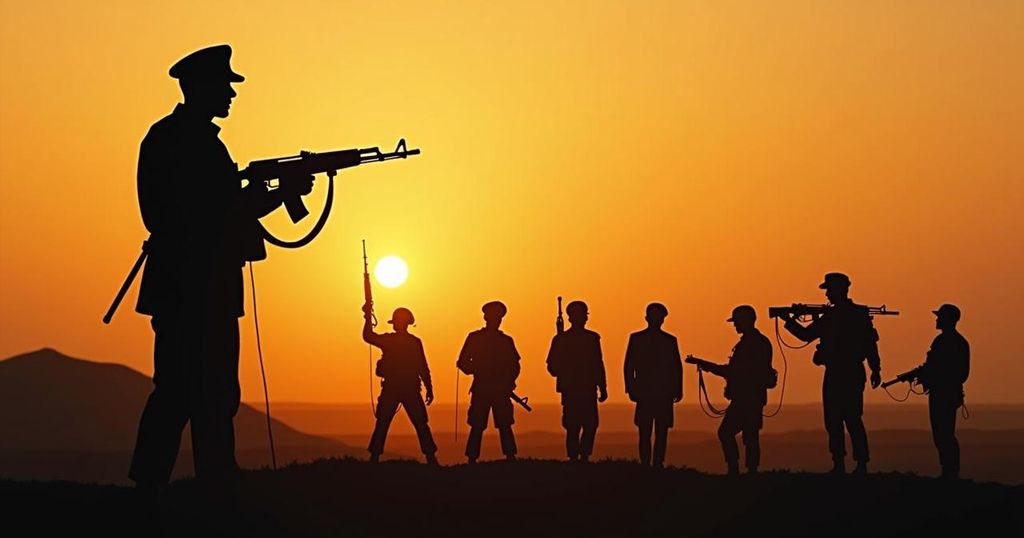Sudanese army chief General Abdel Fattah al-Burhan, in a speech to the UN, criticized the UAE and other regional players for aiding the paramilitary RSF. He stated that without this external backing, the war could have concluded. The Sudanese military has intensified operations in Khartoum against the RSF, amid accusations of severe human rights violations committed by the paramilitary. Despite humanitarian crises, Burhan minimized the situation’s severity, while efforts for peace remain hindered by his refusal to negotiate with RSF leader Hemeti.
During an address to the UN General Assembly, Sudanese army chief General Abdel Fattah al-Burhan criticized regional players, implicitly referencing the United Arab Emirates, for their support of the paramilitary Rapid Support Forces (RSF) amid the ongoing conflict in Sudan. General Burhan emphasized that the RSF has received both political and logistical assistance from various state actors, stating that without such support, the conflict, which has persisted since April of the previous year, could have concluded. He accused these external forces of seeking to exploit Sudan’s resources through coercive means. Notably, Burhan mentioned a conversation with UAE ruler Mohammed bin Zayed, where the latter acknowledged the situation and promised to reassess it. Despite allegations of Emirati backing of the RSF, especially under the command of Mohamed Hamdan Dagalo, known as Hemeti, the UAE has consistently refuted these claims. The Sudanese army has sought assistance from nations like Russia and Iran in their fight against the RSF. In the context of military operations, the Sudanese army has intensified its assault on RSF positions in Khartoum. Following a substantial offensive, the army managed to secure control of key bridges, though the RSF refuted these claims, asserting significant losses inflicted by the army. Eyewitness accounts indicate that military engagements, including airstrikes on strategic locations like the al-Jili oil refinery, are ongoing, while the RSF maintains a siege on el-Fasher, the capital of North Darfur. Despite claims of dire humanitarian conditions in Sudan, General Burhan downplayed the severity, referring to it merely as a “food gap” rather than famine. He attributed the crisis to the RSF’s actions, accusing them of engaging in ethnic cleansing and other human rights violations. Moreover, Burhan labeled the RSF a terrorist organization, underscoring evidence of their alleged genocidal activities against non-Arab communities in Darfur. Amidst this backdrop, Burhan articulated a reluctance to engage in negotiations with Hemeti until certain conditions were met, raising doubts about the prospects for peace. He expressed a desire to uphold the principles of the 2019 revolution, despite prevailing allegations of his administration’s ties to the previous regime of Omar al-Bashir. The continuing conflict, which has displaced over ten million individuals and exacerbated humanitarian crises, underscores the urgent need for resolution and support from the international community.
The current conflict in Sudan, primarily between the Sudanese Armed Forces (SAF) and the paramilitary Rapid Support Forces (RSF), has escalated significantly since April of last year, leading to severe humanitarian consequences. General Abdel Fattah al-Burhan, as the head of the Sudanese military, has navigated complex political dynamics, including accusations against foreign entities, particularly the UAE, for their alleged support of the RSF. This backdrop highlights the intersection between regional influences and local power struggles, raising concerns over the implications for Sudan’s rich resources and the well-being of its populace. The RSF’s historical roots in the Janjaweed militias of Darfur further complicate the narrative, as international observers warn of potential massacres and widespread human rights abuses occurring amidst the fighting. Moreover, the ongoing turmoil has led to significant geopolitical maneuvering, with countries like Russia and Iran becoming increasingly involved, redefining the regional security landscape.
In summary, General Abdel Fattah al-Burhan’s recent comments at the UN highlight the complex web of regional influences in Sudan’s ongoing conflict, particularly implicating the UAE in its support for the RSF. The conflict has resulted in substantial humanitarian crises, with rising concerns of genocide and ethnic cleansing within affected regions. Amidst intensified military operations and a steadfast refusal to negotiate with RSF leader Hemeti, the Sudanese situation remains precarious. Without substantial international intervention and mediation, the prospects for restoring peace appear bleak, perpetuating a cycle of violence that has already displaced millions. The delineation between local strife and external complicity emphasizes the urgent need for a concerted effort to address the multifaceted challenges facing Sudan today.
Original Source: www.middleeasteye.net






